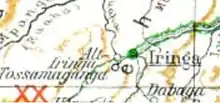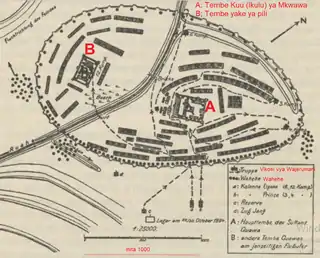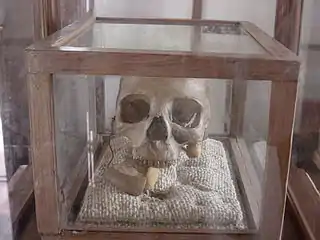Kalenga
Kalenga is an administrative ward in the Iringa Rural district of the Iringa Region of Tanzania. According to the 2002 census, the ward has a total population of 8,172.[1]



Kalenga, which is situated along the side-lines of the great Ruaha River, is one among the historical villages of "Iringa". It is the famous Chief Mtwa Mkwawa of the Hehe tribe had his residence. He fought the German colonial expansion[2] during the colonial era. He had his by then small village Kalenga fortified by a wall that run 5 km around the village, and it was 4 meters high.[3] The town was stormed by a German force in 1894, the fortifications destroyed. Mkwawa continued to resist until 1897 when he was finally hunted down by the Germans and committed suicide. His head was cut off and sent to Germany but returned in 1956. The skull is on display in a small museum in Kalenga, Iringa.
His brother Chambila who was given the name after his heroics during a battle fought alongside him to his last breath. The name was given to him as gratitude by the people for the many Germans he fought. It is a traditional name which means "Shujaa" in Swahili and "Warrior" in English. Mkwawa and his brother are the descendants of a once traveler from the North whose name was "Myinga" a traditional name meaning "A traveler on foot". the same meaning would also be known as traveler in general might be on foot or other means.kalenga is currently a good tourist destination and also known by historians as the capital city of iringa due to its name and its performance toward big nations like Germany, Oman and its historical recognition.
References
- "2002 Population and Housing Census General Report". Government of Tanzania. Archived from the original on 2004-03-18. Retrieved 2009-06-18.
- Later called by the Germans "Old Iringa", see Deutsches Kolonial-Lexikon, article "Iringa", online here (ger.)
- Description of German commander von Scheele, according to John Iliffe, A Modern History of Tanganyika, Cambridge University Press, ISBN 978-0-521-29611-3, page 112